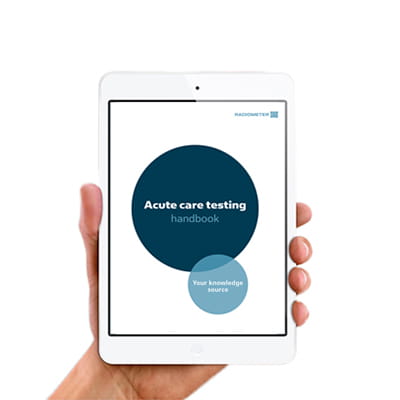Printed from acutecaretesting.org
November 2016
Hypocalcemia - an adverse effect of massive blood transfusion examined
Summarized from Giancarelli A, Birrer K, Alban R. Hypocalcemia in trauma patients receiving massive transfusion. J Surgical Research 2016; 202: 182-87
Plasma ionized calcium (iCa) concentration is normally maintained within the approximate range of 1.15-1.33 mmol/L, so that hypocalcemia (reduced plasma ionized calcium concentration) is widely defined as iCa <1.15 mmol/L. Massive blood transfusion is a relatively rare cause of hypocalcemia that is highlighted by this recently published retrospective study of trauma patients.
The potential for hypocalcemia among patients receiving large amounts of donated blood products over a short time period is due to the presence of the anticoagulant citrate in the bag that donated blood is collected to.
Each unit of packed red cells for transfusion contains approximately 3 gm citrate. This amount of citrate is normally rapidly (within 5 minutes) cleared from blood by the liver.
However, among the very sick patients who require multiple units of donated blood products, this process of liver elimination is compromised. Additionally, of course, the citrate dose is very high.
These two factors determine that citrate accumulates in blood of those receiving massive transfusion where it chelates (binds to) circulating ionized calcium, thereby reducing plasma iCa concentration.
This study was designed principally to determine the incidence and severity of hypocalcemia among trauma patients who have received massive transfusion. Study authors utilized the trauma database of a level 1 (tertiary care) trauma center in Orlando, Florida.
From this database they identified all adult (>18 years) trauma victims admitted to the center who required massive blood transfusion during a 4-year period (2009-2013). After exclusion of five patients whose medical data was incomplete, the final study cohort comprised 156.
Medical records of each were retrieved for analysis; this included iCa results during, and up to 24 hours after transfusion. On average six (range 4-9) iCa results were recorded for each study patient.
For the purposes of this study hypocalcemia was defined as iCa <1.12 mmol/L, and severe hypocalcemia as iCa <0.90 mmol/L. By these measures, 152 patients (92 %) suffered hypocalcemia, and in 111 (71 %), hypocalcemia was severe.
For further analysis, study patients were divided into two groups: iCa <0.9 mmol/L (n=111) and iCa >0.9 mmol/L (n=45). Although the duration of transfusion was not significantly different between the two groups (on average 8-9 hours), those in the iCa <0.9 mmol/L group received significantly more blood products during that period: 34 (range 23-58) versus 22 (range 18-30) units.
The study has thus demonstrated a dose-response relationship between the number of blood product units transfused and severity of hypocalcemia. Results indicate that transfusion of greater than 15 units of blood product is the best predictor of severe hypocalcemia.
The study has demonstrated that hypocalcemia is an almost inevitable consequence of receiving massive transfusion for trauma patients; for most of these patients, hypocalcemia is severe. It highlights the importance of vigilant iCa monitoring during massive transfusion.
The study has confirmed the intuitive notion that severity of hypocalcemia is related to the number of units transfused. It also provides results and discussion that could inform policy surrounding calcium replacement therapy in the context of massive-transfusion-related hypocalcemia. According to the authors, such a policy is currently lacking.
May contain information that is not supported by performance and intended use claims of Radiometer's products. See also Legal info.
Acute care testing handbook
Get the acute care testing handbook
Your practical guide to critical parameters in acute care testing.
Download nowScientific webinars
Check out the list of webinars
Radiometer and acutecaretesting.org present free educational webinars on topics surrounding acute care testing presented by international experts.
Go to webinars







